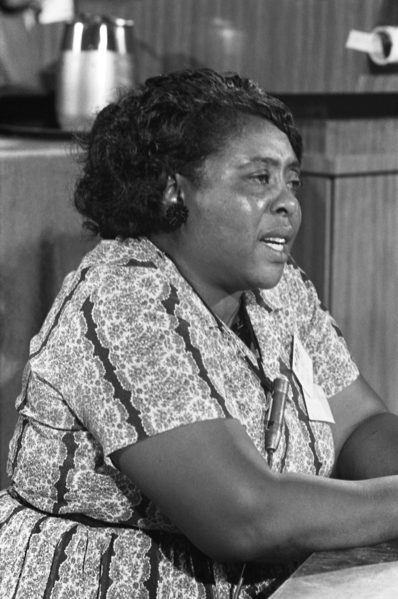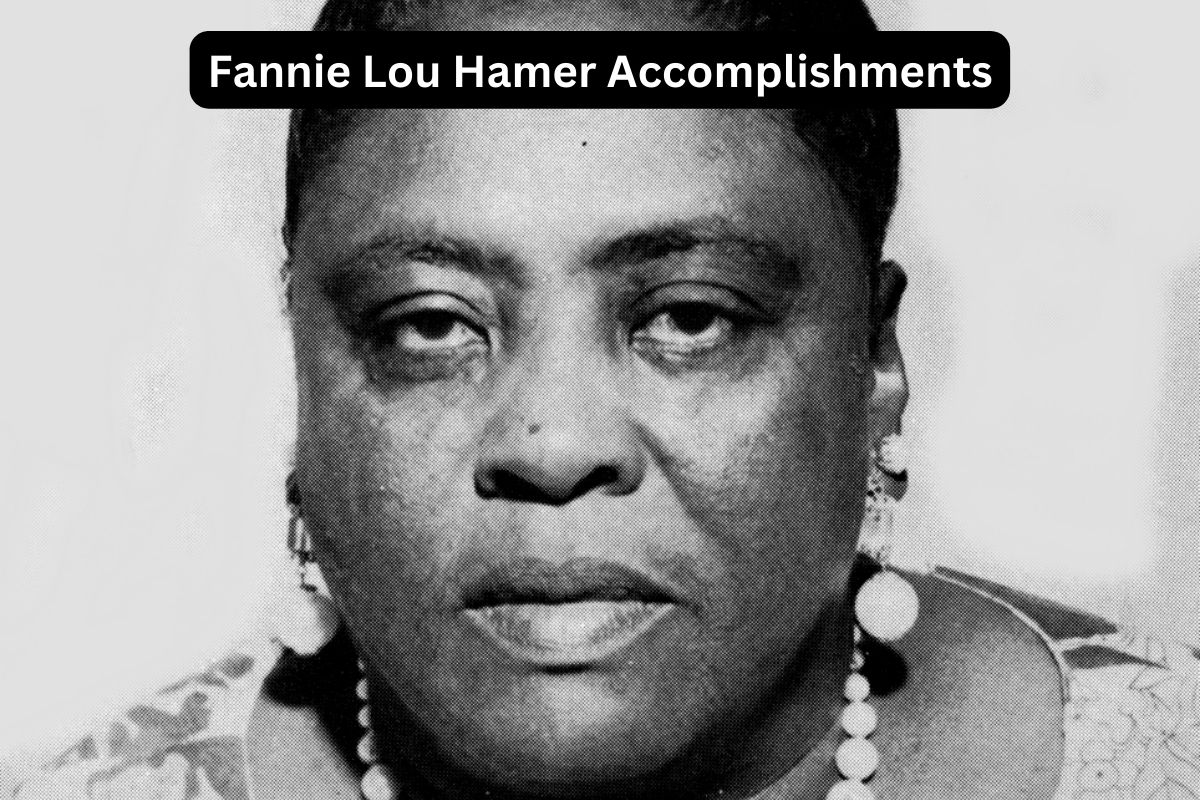Fannie Lou Hamer was a prominent civil rights activist and leader known for her unwavering commitment to racial equality and social justice.
Her tireless efforts in the 1960s made significant contributions to the advancement of African Americans’ rights and political representation.
Hamer played a pivotal role in founding the Mississippi Freedom Democratic Party (MFDP), testified at the 1964 Democratic National Convention, and organized voter registration efforts in Mississippi.
She also focused on economic empowerment, education reform, and continued her activism beyond the civil rights movement. Fannie Lou Hamer’s legacy continues to inspire generations as a symbol of courage, resilience, and the ongoing fight for equality.
Accomplishments of Fannie Lou Hamer
1. Founded the Mississippi Freedom Democratic Party (MFDP)
Fannie Lou Hamer played a crucial role in the establishment of the Mississippi Freedom Democratic Party (MFDP) in 1964.
The MFDP was formed as an alternative to the all-white Mississippi Democratic Party, which systematically excluded African Americans from participating in the political process.
Also Read: Facts About Fannie Lou Hamer
Hamer, along with other civil rights activists, aimed to challenge this discriminatory system and demand equal representation for African Americans within the Democratic Party.
The MFDP became a platform to address the issues faced by African Americans in Mississippi, focusing on voting rights, racial justice, and political empowerment.

2. Testified at the 1964 Democratic National Convention
Fannie Lou Hamer’s testimony at the 1964 Democratic National Convention brought national attention to the struggles and experiences of African Americans in Mississippi.
Her impassioned speech detailed the brutalities and injustices she endured, including beatings and arrests for her voter registration activities.
Hamer’s powerful testimony exposed the deep-seated racism and voter suppression tactics prevalent in Mississippi and highlighted the urgent need for change.
Although the Democratic Party did not immediately grant the MFDP full representation, her testimony had a lasting impact on the party and the civil rights movement, leading to reforms and increased awareness of racial inequality.
3. Organized voter registration efforts in Mississippi
Fannie Lou Hamer dedicated herself to registering African Americans to vote in Mississippi, a state notorious for its systemic racial discrimination and voter suppression tactics.
She faced immense challenges, including physical violence, threats, and economic retaliation, as she worked tirelessly to educate and mobilize African American communities.
Hamer and other activists organized grassroots campaigns, held workshops, and conducted door-to-door outreach to ensure that African Americans understood their rights and were empowered to exercise their voting rights.
These efforts significantly expanded African American voter participation in Mississippi and helped pave the way for future advancements in civil rights.
4. Co-founded the Freedom Summer initiative
Fannie Lou Hamer played a pivotal role in co-founding the Freedom Summer project in 1964. This initiative aimed to combat voter suppression and increase voter registration among African Americans in Mississippi.
Hamer worked alongside civil rights organizations, such as the Student Nonviolent Coordinating Committee (SNCC) and the Congress of Racial Equality (CORE), to recruit and train volunteers—both black and white—to come to Mississippi and support voter education and registration efforts.
The volunteers established Freedom Schools to provide educational opportunities to African American children and conducted door-to-door canvassing to help African Americans overcome barriers to voter registration.
The Freedom Summer project drew national attention to the ongoing struggle for civil rights in Mississippi and furthered the cause of racial equality.
5. Challenged the Democratic Party’s seating of Mississippi delegates
Recognizing the importance of economic empowerment, Fannie Lou Hamer worked to address economic disparities faced by African Americans. She understood that racial inequality extended beyond voting rights and aimed to improve the economic conditions of marginalized communities.
In 1969, Hamer established the Freedom Farm Cooperative in Mississippi. The cooperative provided land and resources to African American farmers, helping them gain economic independence and self-sufficiency.
Through the cooperative, Hamer aimed to combat the unequal distribution of resources and promote economic opportunities for African Americans, contributing to their overall well-being and advancement.
6. Focused on economic empowerment for African Americans
Fannie Lou Hamer was a staunch advocate for education reform, recognizing the importance of equal access to quality education for African American children. She fought against the racial disparities in Mississippi’s education system and worked to address the limited educational opportunities available to black students.
Hamer believed that education was essential for empowerment and worked to secure better resources, facilities, and teaching staff for African American schools.
Additionally, she supported the establishment of Freedom Schools during the Freedom Summer initiative, where African American children received an education focused on their history, culture, and civil rights.
Hamer’s efforts in education reform aimed to break down barriers and ensure that African American children had access to the tools they needed to succeed academically and in life.
7. Advocated for education reform
Fannie Lou Hamer recognized the crucial role of education in empowering African American communities and fought for education reform. She sought to address the inequalities present in Mississippi’s education system, which disproportionately affected African American students.
Hamer advocated for equal access to quality education, working to secure better resources, facilities, and teaching staff for African American schools.
Her efforts aimed to bridge the educational gap and provide African American children with the tools necessary to excel academically and pursue their aspirations.
8. Established the Freedom Farm Cooperative
In 1969, Fannie Lou Hamer established the Freedom Farm Cooperative in Mississippi. The cooperative aimed to address the economic disparities faced by African American farmers and promote self-sufficiency.
Through the cooperative, Hamer provided land and resources to African American farmers, allowing them to grow and harvest crops independently. The Freedom Farm Cooperative served as a means of economic empowerment, fostering economic stability and opportunities within marginalized communities.
Hamer’s initiative helped to counter the historical discrimination faced by black farmers and promote economic self-determination.
9. Continued activism beyond the civil rights movement
Even after the peak of the civil rights movement, Fannie Lou Hamer remained actively engaged in advocating for social justice and civil rights. She continued to work towards voter registration efforts, participating in campaigns and initiatives aimed at expanding African American political participation.
Hamer also spoke out against racial discrimination and inequality, using her platform to draw attention to the ongoing struggles faced by African Americans. Her steadfast commitment to the cause of civil rights, even in the face of adversity, demonstrated her unwavering dedication to justice and equality.
10. Left a lasting legacy as an inspiration for future activists
Fannie Lou Hamer’s contributions and activism have left a lasting legacy. Her courage, determination, and commitment to justice continue to inspire generations of activists and leaders.
Hamer’s work played a significant role in advancing civil rights and shaping the course of history. Her pivotal role in founding the Mississippi Freedom Democratic Party, her powerful testimony at the Democratic National Convention, and her efforts in voter registration and education reform have had a profound impact on the fight for equality.
Fannie Lou Hamer’s legacy serves as a reminder of the power of grassroots organizing, the importance of political participation, and the enduring need for social justice. Her life and accomplishments continue to inspire and guide those working towards a more inclusive and equitable society.
